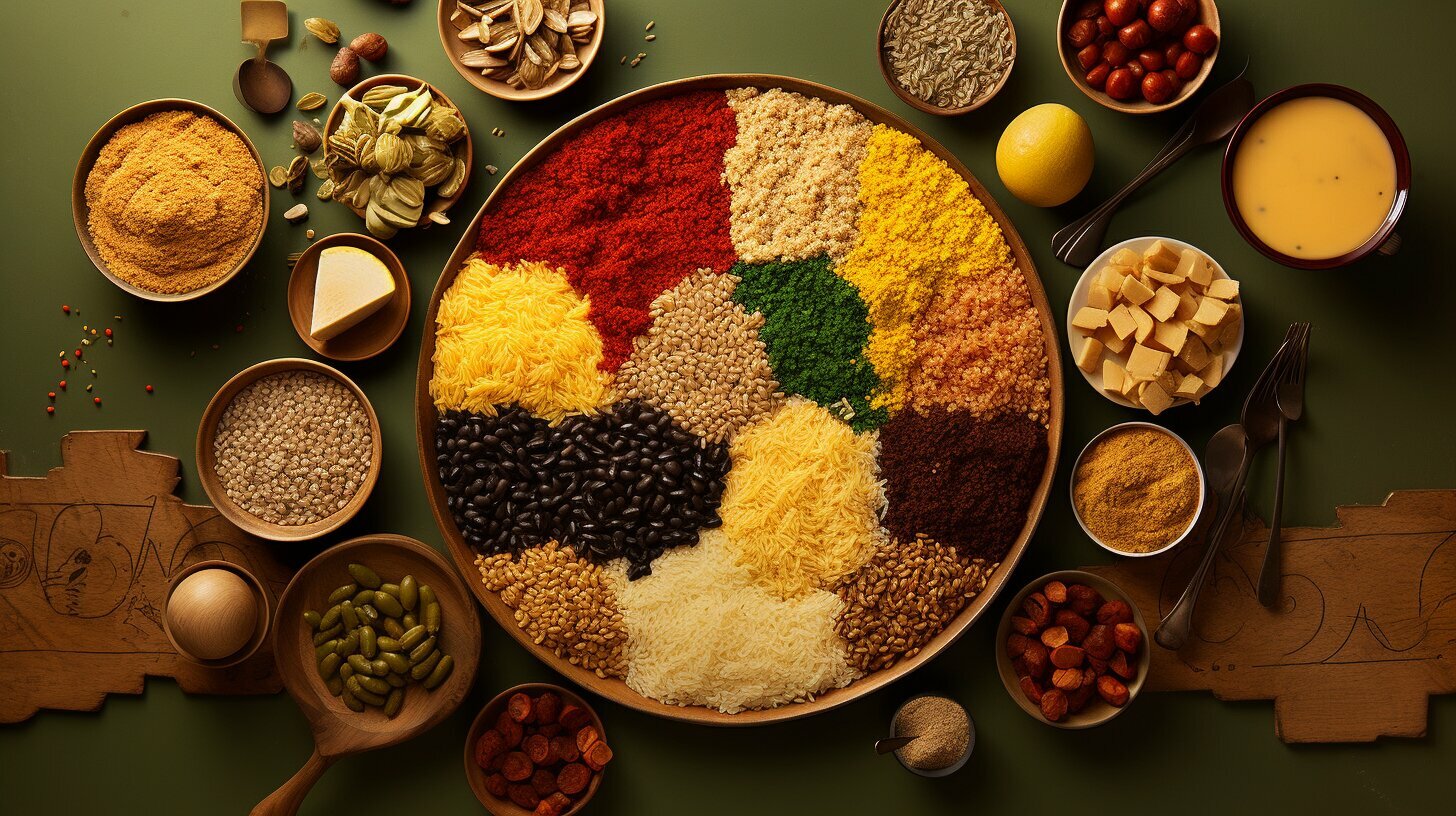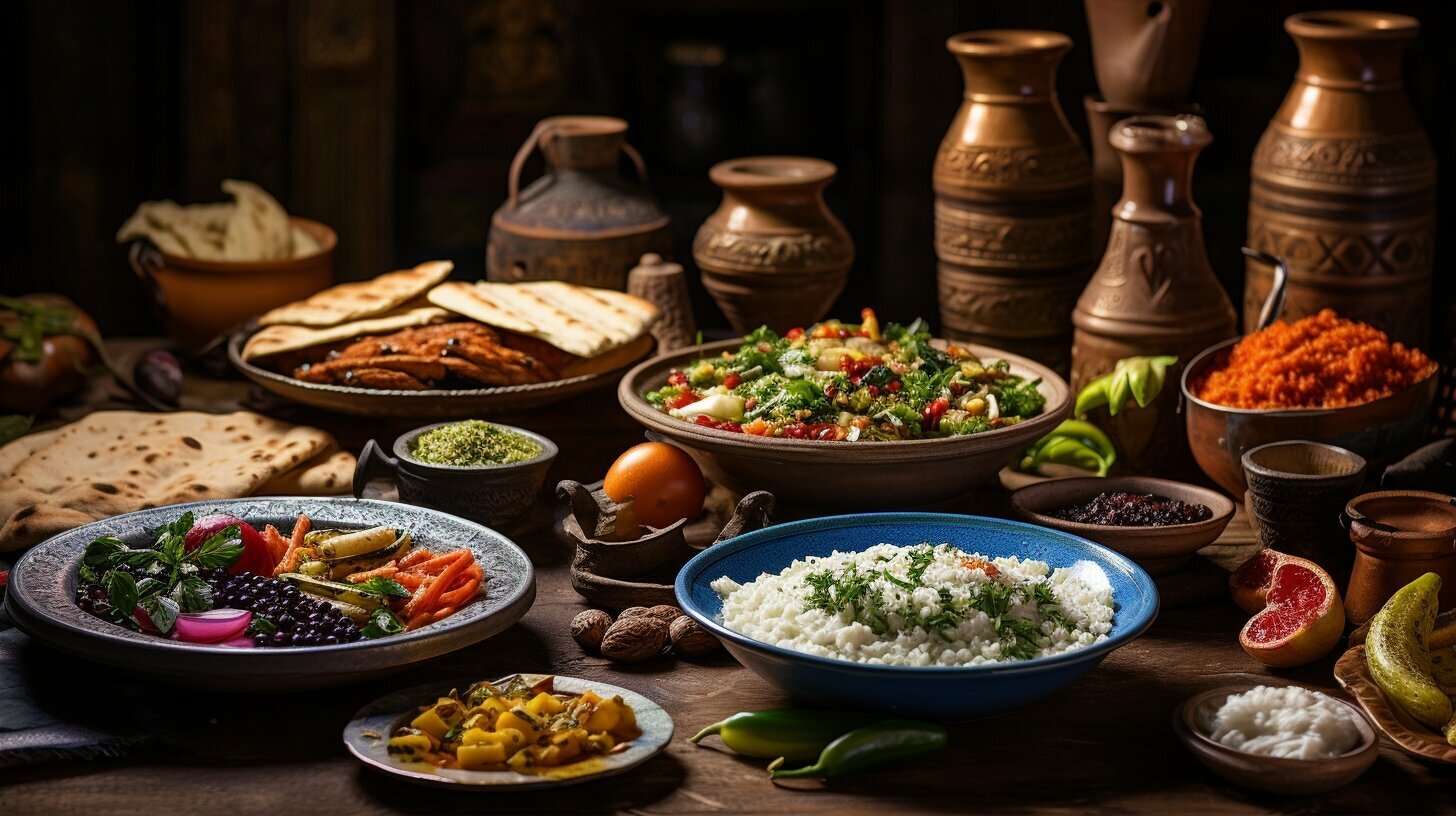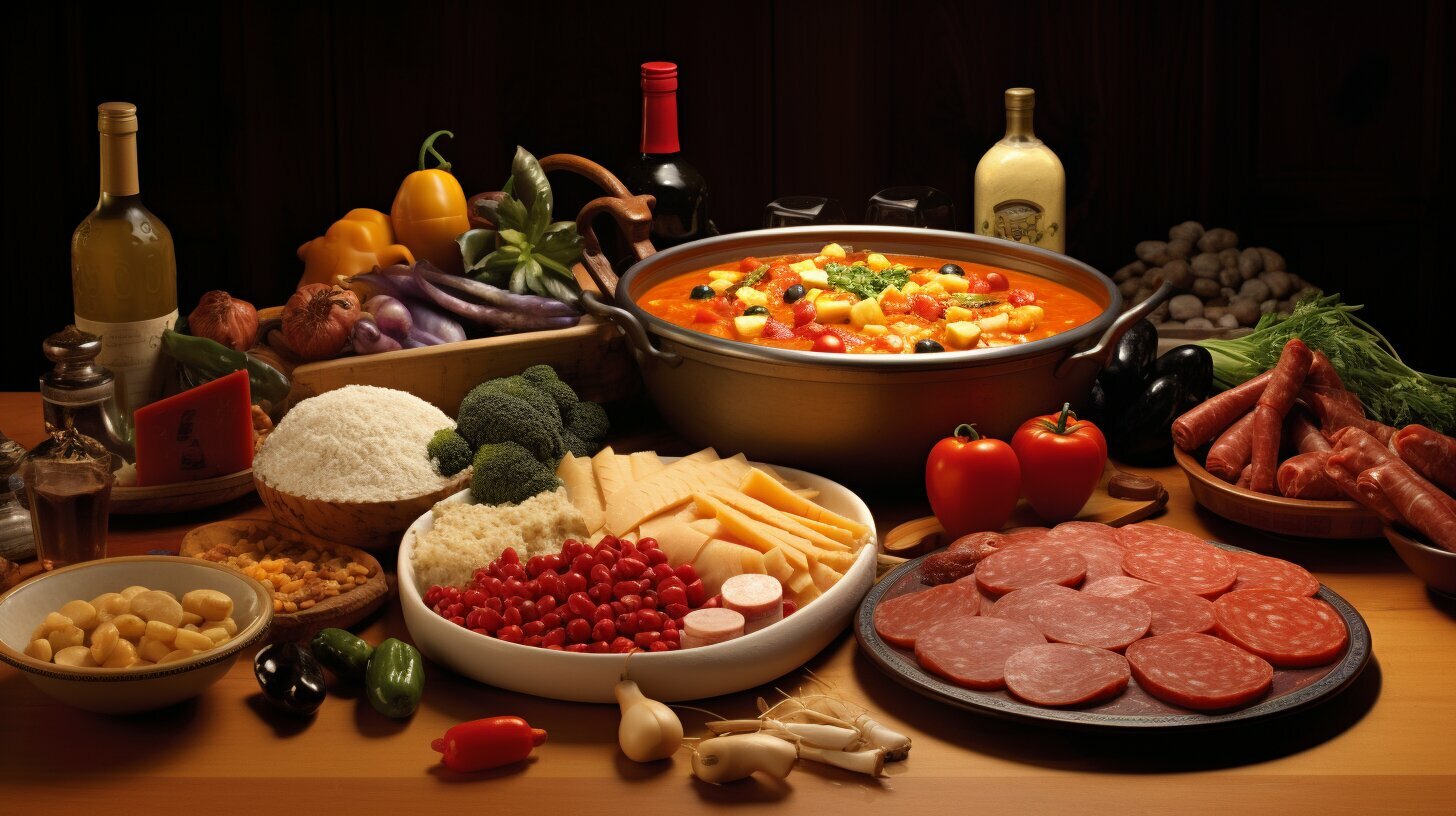When we think of traditional American cuisine, two distinct styles come to mind: African cuisine and Soul Food. However, many people are unaware of the differences between these two culinary traditions. African cuisine encompasses a vast array of culinary traditions across the African continent, while Soul Food was developed in the United States by African Americans. In this article, we will explore the key variations in flavors, ingredients, and cooking techniques that differentiate African cuisine from Soul Food.
- How African Cuisine Differs from Soul Food: African cuisine and Soul Food are two distinct culinary traditions with unique flavors, ingredients, and cooking techniques.
- African Food vs Soul Food: African cuisine encompasses a vast array of culinary traditions across the African continent, while Soul Food was developed in the United States by African Americans.
- African Cuisine Variations: African cuisine varies greatly across the continent, with each country and region having its own unique culinary traditions, ingredients, and flavors.
- Soul Food Influences: While Soul Food was developed in the United States, it was heavily influenced by African culinary traditions.
Key Takeaways:
- African cuisine and Soul Food are two distinct culinary traditions with unique flavors, ingredients, and cooking techniques.
- African cuisine encompasses a vast array of culinary traditions across the African continent, while Soul Food was developed in the United States by African Americans.
- African cuisine varies greatly across the continent, with each country and region having its own unique culinary traditions, ingredients, and flavors.
- Soul Food was heavily influenced by African culinary traditions.
Exploring African Culinary Traditions
African culinary traditions are diverse and rich, with a long history that dates back centuries. Each region of the continent has its own unique culinary identity, characterized by distinct flavors, ingredients, and cooking techniques that have been passed down through generations. In this section, we will explore some of the authentic African dishes that are distinct from Soul Food, and discuss the unique cooking techniques used in African cuisine.
One of the most recognizable African dishes is jollof rice, which is a one-pot dish that is popular in many West African countries. This dish consists of rice, tomatoes, onions, and a variety of spices that may include cumin, ginger, and chili peppers. The rice is cooked in a flavorful broth, resulting in a delicious and fragrant dish that is a hallmark of West African cuisine.
Another classic African dish is injera, which is a type of flatbread that is commonly eaten in Ethiopia and Eritrea. This bread is made from teff flour, which is a grain native to the region, and is cooked on a large griddle. Injera is often served with stews and curries, and its spongy texture makes it perfect for soaking up flavorful sauces.
African cooking techniques also differ from Soul Food. One example is the use of a mortar and pestle to grind spices and herbs, which is often used in African cuisine to create unique flavor blends. Another technique is the use of smoke to flavor meats and fish, which is a common practice in many African countries.
In summary, African culinary traditions are distinctive, diverse, and full of flavor. From one-pot jollof rice to injera flatbread, African cuisine celebrates the unique ingredients and cooking techniques that have been passed down for generations. These differences further emphasize the contrast between African cuisine and Soul Food, each with its own unique cultural significance.
Unpacking the Flavors of Soul Food
Soul Food is a cuisine that developed in the southern United States, originating from the culinary traditions of African slaves. As a result, African cuisine has had a significant influence on the flavors and ingredients found in Soul Food. In this section, we will explore the contrasts between African and Soul Food, examining their unique culinary characteristics.
“Soul Food is the food of the African American heritage that speaks to your soul.”
One of the defining features of Soul Food is its use of spices and herbs, which add depth and complexity to its flavors. Many of these spices, such as cumin, coriander, and turmeric, are commonly used in African cuisine. However, Soul Food also incorporates local ingredients, such as cornmeal and pork, which are less prominent in African dishes.
Additionally, Soul Food often involves slow cooking techniques, such as simmering and braising, which are influenced by African cooking methods. This creates rich and savory flavors that are both comforting and satisfying. In contrast, African cuisine often involves grilling, roasting, and frying, which produce crispy textures and bright flavors.
Moreover, Soul Food has adapted to incorporate local ingredients and flavors, such as seafood from the Gulf of Mexico and Creole influences from Louisiana. These regional variations further distinguish Soul Food from African cuisine.
Despite their differences, African cuisine and Soul Food share a common history and cultural heritage. By exploring their influences and contrasts, we can appreciate the diversity and richness of these culinary traditions.
Key Differences in African Cuisine and Soul Food
African cuisine and Soul Food share some similarities, but they are also drastically different. African cuisine is diverse and varied, with unique flavors, ingredients, and cooking techniques that differ by region. In contrast, Soul Food is a fusion of African, European, and Native American culinary traditions that emerged in the Southern United States during slavery. Here are some of the key differences between African cuisine and Soul Food:
| African Cuisine | Soul Food |
|---|---|
| Use of Spices African cuisine relies heavily on spices, such as cumin, coriander, ginger, and cinnamon, to add flavor and aroma to dishes. The use of spices varies by region but is a defining feature of African cuisine. |
Use of Salt and Fat Soul Food uses salt, sugar, and fat to enhance flavor and preserve food. Salt-cured meats, such as ham hocks and bacon, are common ingredients in Soul Food dishes. |
| Herbs and Leafy Greens African cuisine incorporates a variety of fresh herbs and leafy greens, such as spinach, collard greens, and kale, into dishes. These ingredients provide nutritional value and add depth of flavor to African cuisine. |
Fried Foods Fried chicken, catfish, and other deep-fried foods are staples of Soul Food. While they are delicious, they can be high in calories and unhealthy. |
| Starchy Vegetables Root vegetables, such as yams, cassava, and plantains, are common in African cuisine. They are often boiled or mashed and used as a base for stews and soups. |
Breads and Pastries Cornbread, biscuits, and other breads are often served with Soul Food dishes. Many Soul Food recipes also use flour to make pastries, such as pies and cakes. |
These are just a few examples of the differences between African cuisine and Soul Food. While both culinary traditions are delicious and have their unique flavors and techniques, African cuisine offers a wider variety of ingredients and flavors. It is important to acknowledge the cultural significance of both African cuisine and Soul Food, as they both play an important role in American culinary history.
African Cuisine Variations and Regional Influences
African cuisine is incredibly diverse, influenced by the vast array of regional cultures and traditions across the continent. From North Africa to South Africa, West Africa to East Africa, each region has its own unique culinary traditions, ingredients, and flavors that shape its cuisine.
For example, North African cuisine is influenced by Arab, French, and Mediterranean flavors, featuring dishes like couscous, tagine, and harissa. West African cuisine is characterized by the use of peanuts, yams and plantains, and is renowned for dishes like jollof rice, egusi soup, and pounded yam. In contrast, South African cuisine features dishes like bobotie, biltong, and boerewors sausage, taking inspiration from indigenous ingredients, Dutch, and even Indian influence.
It’s important to note that there are many authentic African dishes that are distinct from Soul Food. While Soul Food has been influenced by African cuisine, it has also evolved with its own distinct flavors and cooking techniques.
Furthermore, African cuisine is constantly evolving and incorporating new influences, such as the fusion of traditional dishes with contemporary ingredients and cooking methods. This has resulted in a modern African cuisine movement that is gaining popularity around the world, showcasing the flavors and creativity of African chefs and culinary traditions.
Conclusion
In conclusion, African cuisine and Soul Food are two distinct culinary traditions with their own unique flavors, ingredients, and techniques. While they share some commonalities, such as a focus on using fresh ingredients and slow-cooking methods, the differences between the two are vast and significant.
African cuisine is characterized by bold spice blends, unique herbs, and the use of ingredients such as yams, okra, and plantains. Soul Food, on the other hand, is heavily influenced by African cuisine but also incorporates elements from other cultures, such as Native American and European cuisine.
The Importance of Cultural Significance
It’s important to remember that both African cuisine and Soul Food are deeply rooted in cultural history and heritage. African cuisine represents the vast array of culinary traditions across the continent, while Soul Food is a testament to the resilience and creativity of African American communities.
By appreciating and celebrating the cultural significance and culinary delights of both African cuisine and Soul Food, we can honor the traditions and contributions of these rich cultural heritages.
FAQ
Q: What is the main difference between African cuisine and Soul Food?
A: African cuisine refers to the diverse culinary traditions found across the continent of Africa, while Soul Food is a cuisine that developed in the United States, influenced by African culinary traditions. The main difference lies in the specific flavors, ingredients, and cooking techniques used in each tradition.
Q: How do African culinary traditions differ from Soul Food?
A: African culinary traditions are characterized by the use of a wide variety of spices, herbs, and unique flavor profiles. Soul Food, on the other hand, typically incorporates ingredients commonly found in African cuisine but may have adapted or simplified recipes over time. The cooking techniques used in African cuisine also differ from those used in Soul Food, resulting in distinct flavors and textures.
Q: Can you provide examples of authentic African dishes that are distinct from Soul Food?
A: Some examples of authentic African dishes that are distinct from Soul Food include jollof rice from West Africa, injera and doro wat from Ethiopia, and tagine from North Africa. These dishes showcase the diverse flavors and ingredients used in African cuisine.
Q: How are the flavors and ingredients in Soul Food influenced by African culinary traditions?
A: Soul Food draws heavily from the flavors and ingredients found in African cuisine. The use of spices such as cayenne pepper, onions, garlic, and herbs like thyme and basil can be traced back to African culinary traditions. Additionally, ingredients like okra, yams, and collard greens are commonly used in both African cuisine and Soul Food.
Q: Are there any key differences in the use of spices, herbs, and flavor profiles between African cuisine and Soul Food?
A: Yes, there are some key differences in the use of spices, herbs, and flavor profiles between African cuisine and Soul Food. African cuisine often incorporates a wide range of spices and herbs, such as berbere spice blend in Ethiopian cuisine and peri-peri spice in Southern African cuisine. Soul Food, on the other hand, may have simplified or adapted the use of these spices and herbs over time.
Q: How does the regional influence impact the variations in African cuisine?
A: The diverse regional influences across Africa contribute to the variations in African cuisine. Each country and region within Africa has its own unique culinary traditions, ingredients, and flavors. For example, West African cuisine is known for its use of bold spices and flavors, while East African cuisine often incorporates a variety of aromatic herbs and stews. These regional influences add to the richness and diversity of African cuisine.
 Skip to main content
Skip to main content


